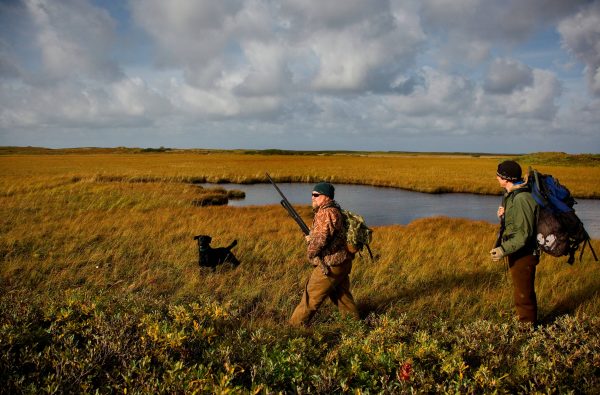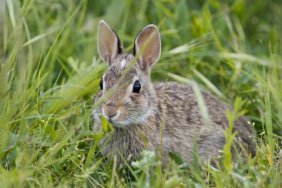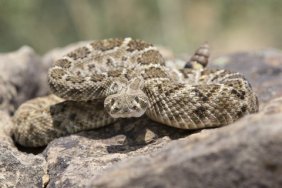Loads of information is passed down from one generation of duck hunters to the next and much of it is sound hunting advise, but there is also plenty of disinformation passed along, which can only be described as duck hunting myth.
Often it is difficult to tell the difference between duck hunting fact or fiction, but here is a reality check for a few common duck hunting myths.
EARLY IS BEST
Many duck hunters believe that the best hunting occurs at the earliest hours of the morning. While hunting is often good at this time of day, it is not always the best.
RELATED: 7 Deer Hunting Myths Debunked
Ducks are often very active right at sunrise, but as the morning progresses they have other waves of activity. In most cases this there is one an hour or two after sunrise and another in the late morning.
It is not uncommon for hunters to pack it up after this first wave of activity. This means if you stick around until lunch time or start hunting later, you can take advantage of quieter hunting times with less hunting pressure, which could improve your odds of success.
CLOUDS ARE OPTIMAL
It remains a widely held belief among waterfowl hunters that cold, cloudy days are best, but there is little evidence to support this myth.
There is, however, some evidence to suggest that cool, breezy sunny days may be better, especially for non-diving ducks. For one thing, when it is clear and sunny, ducks can spot your decoys from farther away, meaning you are likely to bring in ducks from a greater distance.
RELATED: Dispelling 6 Fishing Myths
Also, with bright conditions and a greater contrast between light and dark, it may be more difficult for the ducks to identify your decoys as fakes or to spot your duck blind.
HENS ARE REQUIRED
A myth continues that is related to hen decoys. A significant number of hunters believe that it is important to have hens in your spread, but this belief has no basis in fact.
The truth is that flying ducks are unable to identify hens of a particular species when they are flying. The most significant factor that attracts them to your spread is color, so the most successful strategy is to use all males in your spread. The more color you have, the more likely you are to draw ducks towards you.
DUCKS CALLING
It is a widely held belief among some waterfowl hunters that ducks on the water will call to ducks that are flying. Unfortunately this is not true.
It is true that the sound of duck activity will be one of the factors that can draw ducks to your location, but it is not true that the ducks on the water are actually calling flying ducks to come towards them.
The use of calls imitates duck activity and may help you bring ducks toward you, but your decoys play a more important role in attracting ducks than calling does.
Photo credit: Wikimedia
Wildlife Photographer of Year 2016
-
Splitting the catch by Audun Rickardsen (Norway)
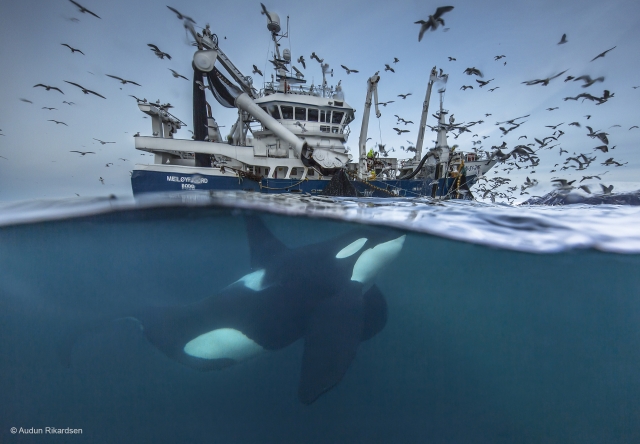
Some fishermen may use the whales to localize the herring shoals. Likewise, many whales have during the years learned the sounds from specific fishing boat when they retrieve their fishing gear, and thereby seek to the boats with the hope to get a “free meal”. This is seemingly a win-win-situations for both parties, but some whales also actively tries to steal the fish form the fishing gear, which can in some cases destroy both the fishing gear and the herring caches. This has led to a debate about the fishing quotas and the interactions between whales and fishing boats. These interactions have also lead to an increasing number of accident where the whales have been entangled in the fishing gear. I developed my own underwater housing to be able to take split pictures like this under very low light conditions. Ordinary underwater housings for split pictures will not work due to several optical challenges during low light conditions.(some dust/ flare due to salt crustal on the underwater housing glass is removed in the digital post-processing). Canon 5DIII, Canon 11-24 f4; 1/200 sec; f/6,3; ISO 640, self made underwater housing, Lee filter 1.2.
-
Golden relic by Dhyey Shah (India)
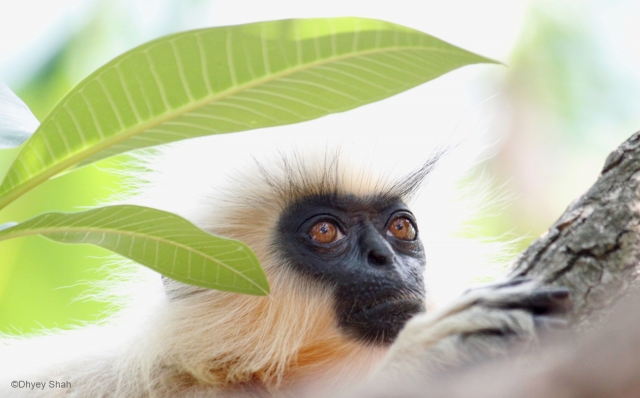
Gee’s Golden Langur,India’s old primates are now in endangered category and increasing human population becoming really concern losing their habitats. Few of them are survived on peacock Island near Guwahati in North East area of India. Conservation status:IUCN : EndangeredCamera : Canon 500dLens : canon 55-250Place : Guwahati,India
-
This disappearing fish by Iago Leonardo
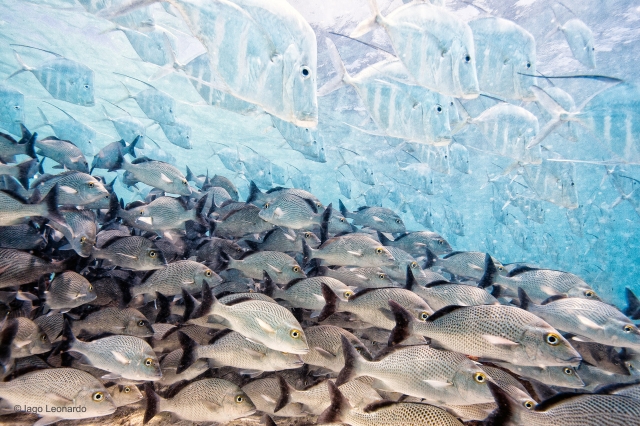
We can see these fish in many aquariums in the world, but rarely can see the incrediblee ability they have in the wild. This species of fish (selene bomer), which takes its name from the Greek goddess of the moon, Selene, used the refraction from the sun light to appear and disappear and mislead their predators. Free diving, this photo was taken in Isla Contoy, Mexico with a Canon 5D, housing ikelite Canon 20 mm. F:2.8Post-processing: To highlight the fish I had to use a special filter of contrast, since in the raw image it's hardly appreciated. Colour temperature, dust spotting, global and local saturation and exposure changes.
-
Thistle-plucker by Isaac Aylward (UK)
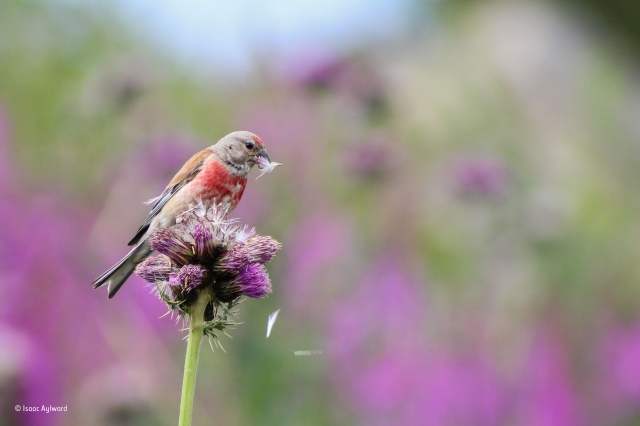
This shot of a delicate linnet against soft purple knapweek was shot in Bulgaria. While hiking in the Rila Mountains, the thistle was spotted on a flowerhead
-
Playing pangolin by Lance van de Vyver (New Zealand)
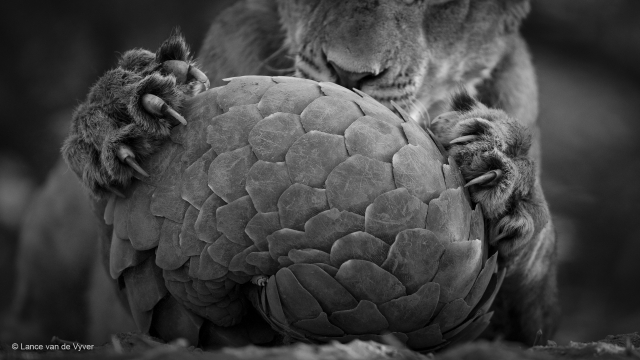
A young lion tries to figure out a way through a pangolins defences.
-
Crystal precision by Mario Cea (Spain)
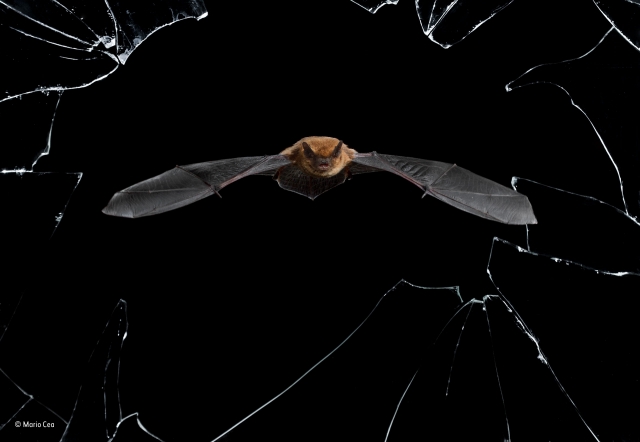
-
Nosy neighbor by Sam Hobson (UK)
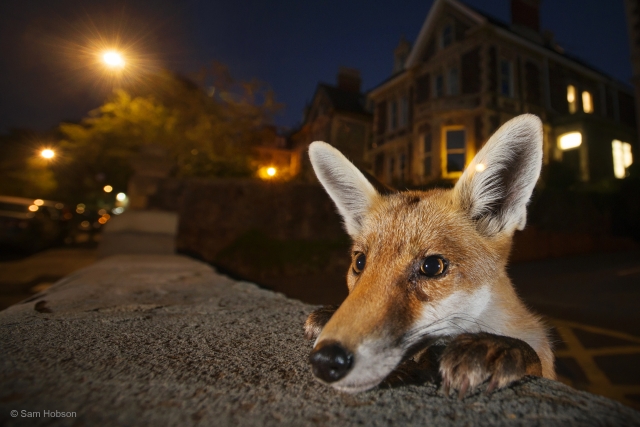
The red fox is perhaps one of the most familiar wild animals that thrives in an urban environment, but often a fleeting glimpse is all we get. Foxes may live alongside us in towns and cities, but they have learnt to be wary of man and often hide in the shadows. I spent a summer gaining the trust of a family of foxes in Bristol and found that if I introduced anything new to their environment, the curious cubs would quickly become interested and investigate it thoroughly. This gave me an opportunity to capture some incredibly intimate portraits of these friendly fox cubs - I left my camera positioned on a wall in their territory and fired it remotely when this bold cub poked his nose up to investigate.
-
Collective courtship by Scott Portelli (Australia)
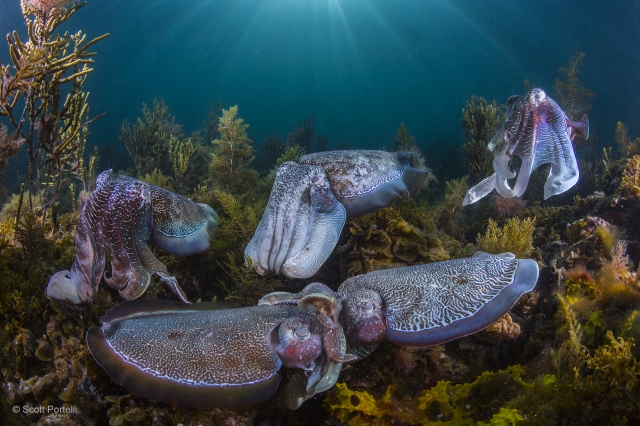
The Aggregation of Giant Australian Cuttlefish is rare event that can only be seen at a certain time of year, where thousands of cuttlefish compete for mating rights. a vivid display of colours and textures is what entices the opposite sex to mate.
-
Termite tossing by Willem Kruger (South Africa)
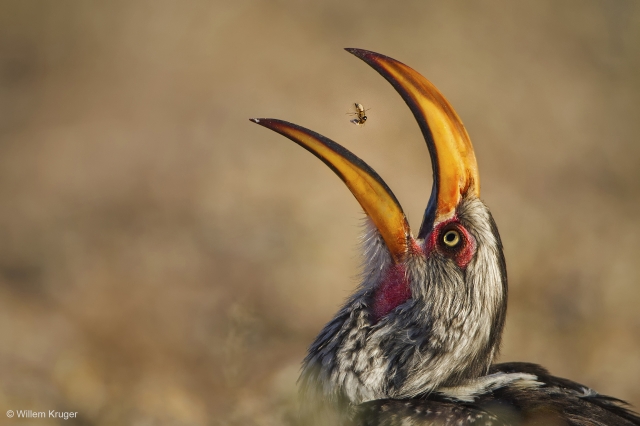
Exact location:Near the northern entrance to the 14ht borehole, Kgalagadi Transfrontier Park, South AfricaDescription – This image was near the northern entrance to the 14th borehole water hole, Kgalagadi Transfrontier Park, South Africa. We saw group of Southern Yellow Hornbill birds foraging on the ground as we drive pass the entrance to the waterhole. They were feeding on termites and it was interesting to see how the termite was thrown into the air and then the bird catches it again in order to swallow it. One of the birds came close my vehicle and it was catching termite after termite. Eventually this one bird ended up about 6 meters from my vehicle and I did some macro photography with my 600mm lens as the bird was tossing the termites in the air in order to swallow it.No baiting was used.
-
Dancing with the stars by Imre Potyo

After a few decades, the Danube mayfly (Ephoron virgo) have returned to the river Danube, probably due to the increasing water quality. The fantastic mass swarming of these mayflies is one of the most exciting phenomenon for me. My image was taken in a dark, near-natural bank of Rába river (a tributary of the Danube) with long exposure, flash and flashlight. Unfortunately, the lamp-lit bridges have negative influence to them, because they are attracted to the lamps, become exhausted, lay their eggs to the asphalt roads of the bridge and perish immediately. The team of the Danube Research Institute in cooperation with the Environmental Optics Laboratory plan to solve this biooptical and environmental problem. This image is very precious to me as I can draw the attention to these spectacular water insects and their complex ecological light trap, which endanger their survival.Rába river, Hungary. Nikon D90, Sigma 17-70 mm, f/2.8-4.51.3 sec, f/14, ISO 800, 17 mm.
